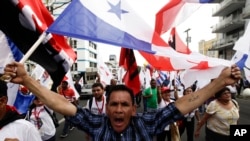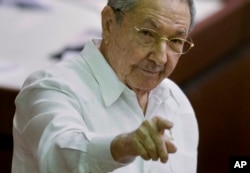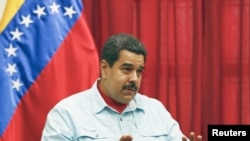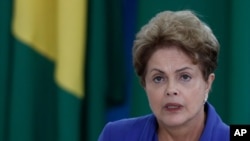When President Barack Obama meets Friday and Saturday with other leaders of the Americas, he will encounter a charged environment full of factions – some allied with him, some arrayed against the U.S. and most trying to secure an economic future amid diminishing resources.
Obama's participation in this year's Summit of the Americas comes as his administration seeks to normalize relations with Cuba but also as it takes a tough stand against the government of Venezuela and its harsh attempts to silence dissent in the oil-rich but economically struggling nation.
The U.S. is clearly the biggest economic power and, as such, the most influential voice in the hemisphere. But its sway over Latin America is limited. Even U.S. allies have not been ready to march in lockstep with their big neighbor to the north.
Among the leading players in this summit:
Cuba: After half a century of U.S.-Cuban estrangement, any engagement between Obama and Cuban President Raul Castro will be historic.
Although the White House says the two leaders will surely interact while attending the summit, no formal bilateral meetings had been scheduled ahead of the trip. Obama on Wednesday said the State Department had finished its review of whether to remove Cuba from its list of state sponsors of terrorism. He said he would act soon after receiving a formal recommendation.
Cuba's removal from the list has long been anticipated, and Obama for months has signaled he's prepared to take that step once he received a formal recommendation. Havana has eagerly sought removal from the list as part of a reopening of diplomatic relations between the United States and Cuba.
All eyes will be on the two leaders and on whether Obama announces Cuba's removal from the terror-sponsor list.
"It's one thing for them to meet – it’s an international forum – and shake hands politely,'' said Raul Madrid, a Latin American expert at the University of Texas. "It's another thing for them to be seen actually talking to each other at length, having some kind of negotiations, trying to work something out.''
Hopes ran high in the initial days after the December 17 announcement that the U.S. and Cuba could move quickly toward normalized ties. In the initial days, there was a flurry of activity: an exchange of prisoners, intensive meetings in Havana and looser restrictions on travel and trade.
Since then, the pace appears to have slowed. The U.S. had hoped to reopen an embassy in Havana before the summit, but that has not yet materialized.
Venezuela
Obama recently slapped sanctions on seven leading Venezuelans in protest over President Nicolas Maduro's crackdown on dissidents. In so doing, the administration described Venezuela as a threat to U.S. security. That's just boilerplate language when imposing sanctions, the U.S. says. But Maduro, facing increasing economic pressure as oil prices have plummeted, has used the designation as an anti-U.S. rallying cry.
Obama's challenge is to prevent the summit from being overshadowed by U.S. tensions with Venezuela, which have irked other Latin American nations and increased the pressure on the U.S. to back up its outreach to Cuba with some tangible results.
"The sense is we want to lead, but we also want to make it easier for other countries to follow us. The timing of the sanctions has made it harder and I wonder what the urgency was,'' said Carl Meacham, director of the Americas Program at the Center for Strategic and International Studies.
But Shannon O'Neil, Latin American expert at the Council on Foreign Relations think tank, said Maduro wants to highlight the sanctions to overshadow changes in U.S.-Cuba relations and his own economic and political troubles.
"Given the usual anti-U.S. rhetoric coming out of Venezuela and the limiting of the movement of U.S. diplomats in the country, it is unlikely Venezuela's approach at the summit would be much different'' even if no sanctions had been imposed, she said.
ALBA nations
These are the countries in the 12-member Bolivarian Alliance, a coalition of center-left countries in Latin America and the Caribbean known as ALBA. Together, they represent the face of opposition to the United States.
Their members include Maduro of Venezuela, Castro of Cuba, and Presidents Rafael Correa of Ecuador, Daniel Ortega of Nicaragua and Evo Morales of Bolivia.
Member countries also include Antigua and Barbuda, Dominica, Saint Lucia, and Saint Vincent and the Grenadines. Grenanda and St. Kitts and Nevis joined in December.
Most recently, alliance members have banded in support of Venezuela, denouncing the U.S. sanctions against the seven Venezuelans and claiming that the Obama administration is trying to undermine Maduro.
"You are going to have two camps,'' said Meacham of the Center for Strategic and International Studies. "You are going to have the ALBA countries. And then you're going to have countries that support what the United States is doing but may not be as vocal in their support of the United States because of the sanctions.''
SICA nations
These are the eight countries that comprise the Central American Integration System, known as SICA for its Spanish acronym.
Obama plans to meet with SICA leaders Friday to highlight U.S. economic efforts in the region. Key to him are three group members in particular: El Salvador, Guatemala and Honduras.
The remaining members include Belize, Costa Rica, the Dominican Republic, Nicaragua and Panama.
Obama has included a $1 billion assistance package to the region in his 2016 budget request, prompted in part by last year's increase in the number of unaccompanied minors from Central America who turned up at the Texas border.
The U.S. aid aims to improve economies and security. The murder rates in El Salvador, Guatemala and Honduras are among the five highest in the world.
Obama's meeting with the SICA heads of state follows a meeting last month by Vice President Joe Biden in Guatemala to discuss government reforms and investments.
Brazil
Despite winning 52 percent of the vote in her re-election last fall, Brazilian President Dilma Rousseff is facing vocal calls for her resignation or impeachment amid a major corruption scandal and dour economic straits. Brazil's currency has plunged roughly 18 percent against the dollar this year and economic growth has been virtually nonexistent.
Any interaction between Obama and Rousseff will be their most significant encounter since Rousseff learned last year that the National Security Agency had spied on her communications. Those revelations leaked by former NSA contractor Edward Snowden infuriated the Brazilian leader, who canceled a visit to Washington in protest.
The White House has insisted that the rift has been mended. Biden extended a new invitation for Rousseff to visit when he spoke to her by phone last month, but Rousseff isn't expected to decide whether to accept the invitation until after the summit.
Argentina
President Cristina Fernandez was once one of Obama's more vocal fans, but these days the U.S. president might prefer that Fernandez just keep quiet.
The first woman elected president of Argentina, Fernandez as well as her administration has been rocked by the strange death of a prosecutor who had made allegations against her. The prosecutor, Alberto Nisman, was found shot dead in his bathroom in January – four days after he accused Fernandez and her aides of making a deal with Iran to cover up the alleged roles that Iranian officials played in the 1994 bombing of a Jewish center in Argentina.
A federal appeals court has thrown out the case, and Fernandez has always denied the allegations. Still, the controversy has damaged Fernandez's credibility and her popularity has taken a hit.
Obama may be more concerned about a long-running debt dispute with Argentina. The dispute dates back to the country's 2001 default on $100 billion and rose all the way to the U.S. Supreme Court when a group of U.S. hedge fund managers demanded full payment.
The high court ruled against Argentina, affirming that the country must first settle debt with a small group of hedge funds before making interest payments on debt owed to other lenders; a day later, the rating agency Standard & Poor's downgraded Argentina's rating to junk status.









